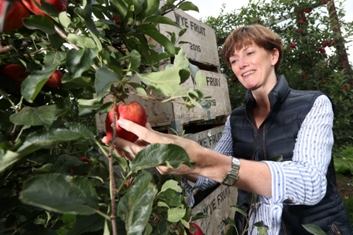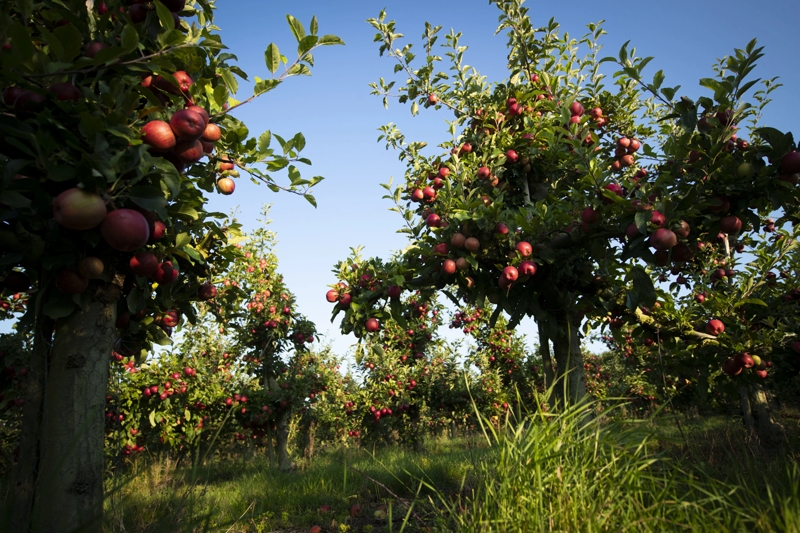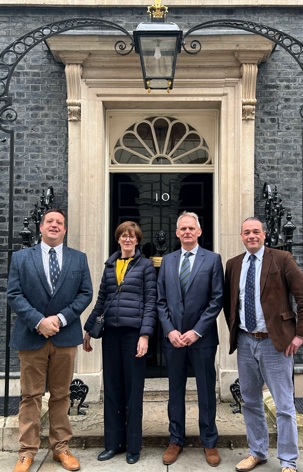

 British Apples & Pears Limited (BAPL), the organisation representing commercial top fruit growers, has published its first ever manifesto ahead of a 2024 general election.
British Apples & Pears Limited (BAPL), the organisation representing commercial top fruit growers, has published its first ever manifesto ahead of a 2024 general election.
Designed to provide all political parties with clear guidance on how best to secure the future of the British apple and pear industry, the manifesto sets out ten clear actions.
Below: BAPL Executive Chair Ali Capper on her family farm
 "Any new British government has a great opportunity to turn around the current crisis facing UK apple and pear growers." Explained Ali Capper, executive chair of BAPL. "We have set out clear steps that we believe are both necessary and practical to achieve that.
"Any new British government has a great opportunity to turn around the current crisis facing UK apple and pear growers." Explained Ali Capper, executive chair of BAPL. "We have set out clear steps that we believe are both necessary and practical to achieve that.
"We understand that there will be many competing priorities for any new government, but the actions in our manifesto have extremely far-reaching and positive impacts. Implementing these actions will help ensure domestic food security, support the rural economy, our environment and the health of the nation. Those ambitions should be firmly on the agenda of any government."
The ten actions in the BAPL manifesto concern a range of issues from fair contracts with supermarkets to labour, environmental protection and innovation.
BAPL will be sending the manifesto directly to the leaders of all the main political parties as well as their key representatives for agriculture, farming, health, finance and labour.
"In addition to sending them our new manifesto, we will be offering face-to-face briefings with the political parties." Explained Ali Capper. "We are very keen to work with anyone who is open to our ideas for a stronger and sustainable British apple and pear industry."
BRITISH APPLES & PEARS LIMITED - MANIFESTO FOR 2024

British Apples & Pears Ltd represents 95% of all British dessert and culinary apple and pear growers in the UK, with almost 300 members.
The UK produces some of the best apples and pears in the world. We have the ideal climate, centuries of experience and are leading innovation in top fruit growing.
Given the global impact of climate change, we will not be able to continue to rely on imports, we can and must increase home production to feed ourselves and, potentially, populations overseas.
Apple and pear orchards have significant carbon sequestration potential and can help the UK meet its net zero targets. Apple and pear trees also improve soil structure and increase biodiversity, especially when compared to arable crops.
However, British apple and pear growers are in crisis, after years of increased costs and low supermarket returns. A new British government has an opportunity to turn around the crisis facing UK growers and in doing so ensure domestic food security,
support the rural economy, our environment and the health of the nation.
The UK apple and pear grower crisis in numbers:
* Since early 2022, British apple growers have faced 30% increases in costs of production and received just 8% increases in returns from supermarkets.
* Almost half (45%) of British apple and pear growers say retailers buy only on price and that it's not a true partnership.
* 70% of growers say they are less confident than they were a year ago and almost half (45%) say they have scaled back their future investment plans.
What a new UK government could do to help turn around this crisis:
1. Fair contracts with supermarkets - impose the fair dealing clause from the Agricultural Act 2020 with specific attention on pricing mechanisms and profitability.
2. Labour - make the Seasonal Workers Scheme a five-year scheme so that growers can plan for the longer term and remove the cap on seasonal workers. Ensure the Skilled Worker visa route offers employers an accessible and economically viable solution to skills shortages in the UK workforce.
BAPL commissioned British Growers to survey its members during November 2023. 30 growers and 10 packers responded. The survey was anonymous.
3. Energy price protection - include commercial horticulture in the ETII (Energy and Trade Intensive Industries) scheme or other future energy protection schemes, to protect growers from future hikes in energy prices.
4. Food policy - replace the "cheap food policy" with a "British food policy". Too often British produce is being substituted for imports that may sometimes be cheaper but are often grown to a lower standard. We need government support for British produce that has travelled fewer food miles and is top quality.
5. Carbon border adjustment mechanism (CBAM) - ensure that future carbon border adjustments are developed to include food. This would mean that British growers are not competing with cheap imports with a higher carbon and water footprint, while being targeted to reduce footprints in the UK.
6. Environmental protection - ensure that ELMs (Environmental Land Management schemes) work with food production, not instead of it. For example, recognising the value to the environment of orchards and incentivising/funding environmental measures within commercial orchards.
7. Finance - introduce a green finance strategy that ensures supermarkets are incentivised to choose British over imported fruit. Support a flexible future Producer Organisation (PO) and Productivity scheme to enable UK growers to better compete with EU producers.
8. Health - ensure that health strategies actively support the inclusion of fresh and minimally processed food.
9. Research and innovation - provide funding for orchard innovations that deliver sustainability and productivity gains and increase safe food production. Reduce the bureaucracy and increase the funding for applied on-farm research available through Innovate UK.
10. Crop protection - implement a regulatory framework for crop protection products that is cost effective (for applicants) and delivers competitive advantage for British growers.
PICTURE -Left to right: Ross Goatham, Ali Capper, James Simson, Tom Hulme
 On Tuesday, Ali Capper sent me a short resume of the meeting at No 10 the previous day.
On Tuesday, Ali Capper sent me a short resume of the meeting at No 10 the previous day.
Dear John
We had a very useful meeting at No 10 yesterday with the Defra Policy Team for No 10. We used the recently published BAPL manifesto as the basis for the conversation. We emphasised the need for action from government on the Seasonal Workers Scheme and Fairness in the Supply Chain.
Steve Reed shadow Secretary of State Defra and Daniel Zeichner shadow Farming Minister and a team of Labour Party advisers held a roundtable yesterday at Millbank for a range of representatives from across the food sector. I contributed fully to the discussion and a hard copy of our manifesto was given personally to all the key MPs and their advisers.
Since the start of 2024 I have held three meetings with Tim Farron, shadow Secretary of State Defra of the Liberal Democrats.
I hope the above helps with your article and lovely to catch up on the phone.
Kind regards, Ali Capper - Executive Chair BAPL
Accompanying Ali Capper to Downing Street on Monday: AC Goatham Managing Director Ross, Tom Hulme - Director AC Hulme Farming and James Simpson MD Adrian Scripps Ltd. all of whom are fellow board members of BAP.
The English Apple Man Comments
This industry that I have been part of for more than 'sixty five years' is in it's most precarious state in that time period. Many challenges have been foisted upon our growers; certainly before entry into the EEC (Common Market) in January 1973 when 'older and wiser' members of the fruit growing fraternity warned it would seriously undermine our profitability.
BUT this was by comparison a minor skirmish compared to the current situation.
During the the late 1970's and 1980's the fruit industry modernised the industry from an outdated extensive format to a more intensive format with ever closer planting distances. For a while we soldiered on with our traditional Cox apples, early season Discovery was for a while popular (not much competition then) Worcester Pearmain, Spartan, Egremont Russet, Et al. were prominent on Supermarket shelves.
During the '90's many newer 'home grown' varieties made their mark: Meridian, Early Windsor, Delbard Estivale Et al.
BUT: New invaders were on the march! Imported Gala and Braeburn were displacing our Cox as the most sought after premium apple.
As home grown favourites declined in popularity, Gala and Braeburn rapidly became the 'new kids on the block'
But once again, we met the challenge, or more correctly a forward thinking bunch of English growers, advisors and marketeers recognised the suitability of Gala apples as a perfect replacement as our new 'leader of the pack'
Over the next 25 years Gala rose to become our (UK's) most popular dessert apple consumed and grown in the UK.
Next to make a mark was Braeburn, initially thought to be unsuitable for our cooler climate, but by the late 1990's being grown and marketed here (like grapes, enjoying our warmer climate) and now our second most popular UK grown variety.
Up until the 2020's the resurgence of our apple industry continued, the more productive Gala and Braeburn led the way, albeit in recent years with increasing downward pressure on prices from our Supermarkets, and with the spiralling inflation after Covid and War in Ukraine added, the the current situation is UNTENABLE!
![]() That is all for this week
That is all for this week
Take care
The Engish Apple Man